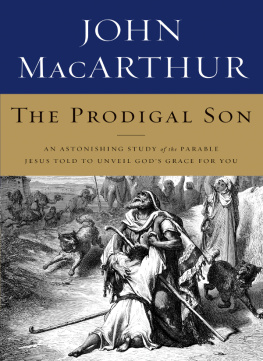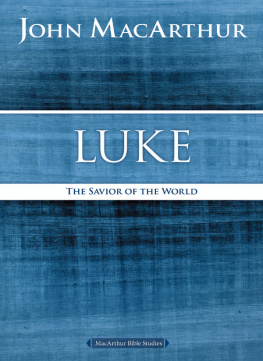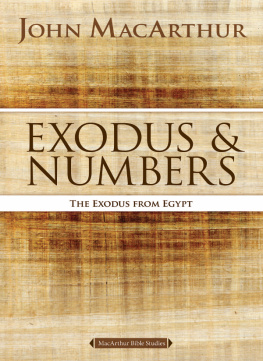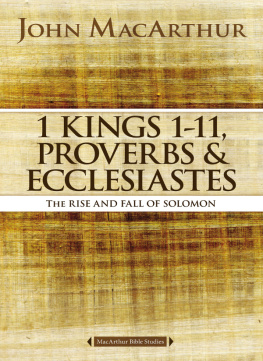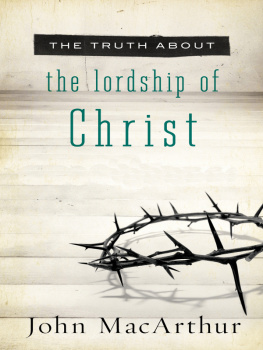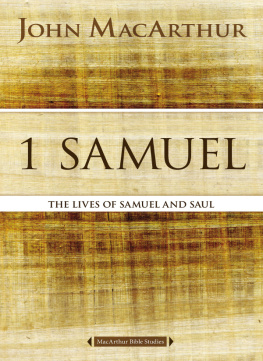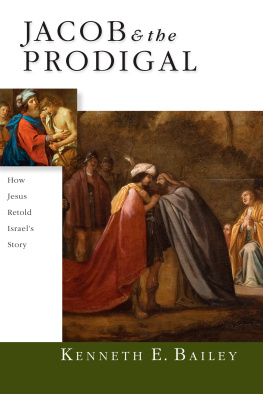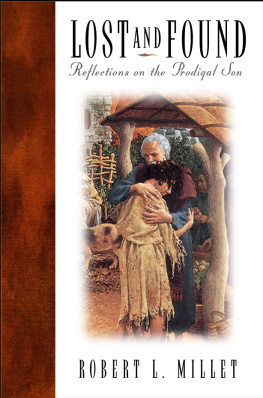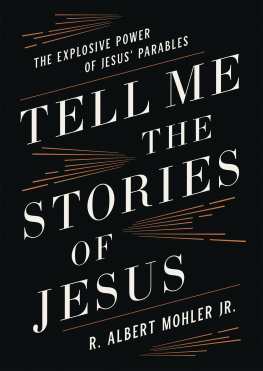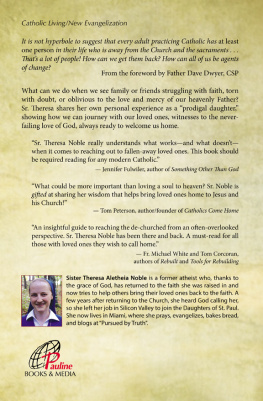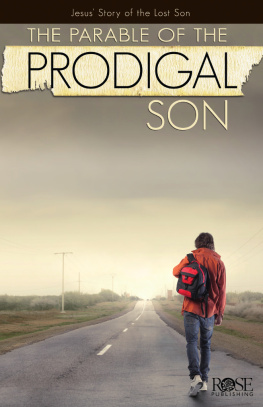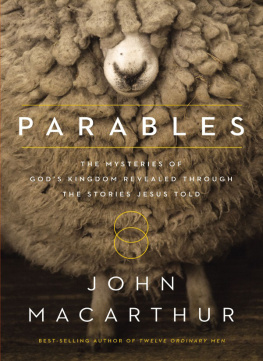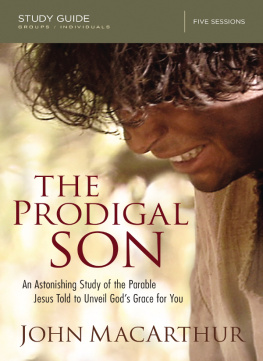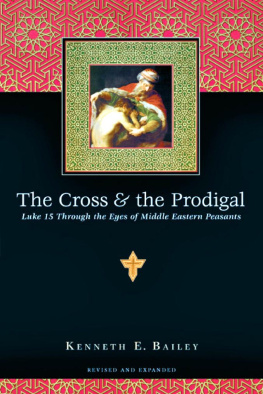2008 by John MacArthur
All rights reserved. No portion of this book may be reproduced, stored in a retrieval system, or transmitted in any form or by any meanselectronic, mechanical, photocopy, recording, scanning, or otherexcept for brief quotations in critical reviews or articles, without the prior written permission of the publisher.
Published in Nashville, Tennessee, by Nelson Books, an imprint of Thomas Nelson. Nelson Books and Thomas Nelson are registered trademarks of HarperCollins Christian Publishing, Inc.
Originally published as A Tale of Two Sons.
Published in association with the literary agency of Wolgemuth & Associates, Inc.
Edited by Phillip R. Johnson
Unleashing Gods Truth, One Verse at a Time is a trademark of Grace to You. All rights reserved.
Thomas Nelson titles may be purchased in bulk for educational, business, fund-raising, or sales promotional use. For information, please e-mail SpecialMarkets@ThomasNelson.com.
Unless otherwise noted, Scripture quotations are taken from the NEW KING JAMES VERSION. 1982 by Thomas Nelson, Inc. Used by permission. All rights reserved.
Scripture quotations marked NASB are taken from the NEW AMERICAN STANDARD BIBLE, The Lockman Foundation 1960, 1962, 1963, 1968, 1971, 1972, 1973, 1975, 1977, 1995. Used by permission.
Scripture quotations marked KJV are taken from the KING JAMES VERSION. Public domain.
ISBN 978-1-4002-0268-3 (trade paper)
ISBN 978-1-4185-8887-8 (eBook)
Library of Congress Cataloging-in-Publication Data
MacArthur, John, 1939
A tale of two sons : the inside story of a father, his sons, and a shocking murder / John MacArthur.
p. cm.
Includes bibliographical references.
ISBN 978-0-7852-6268-8 (hardcover)
ISBN 978-1-4002-8006-3 (IE)
1. Prodigal son (Parable) 2. Bible. N.T. Luke XV, 11-32Criticism, interpretation, etc. I. Title.
BT378.P8M23 2008
226.8'06dc22
2007051511
10 11 12 13 14 RRD 6 5 4 3 2
To my sons, Matthew and Mark, who have never subjected theirdad to any of the griefs and heartaches of the Prodigals father.Their faithful love for Christ and their abiding affection for theirfather are vivid, living, daily reminders to me of how blessed mylife has been.
CONTENTS
PART 1
THE PARABLE
PART 2
THE PRODIGAL
PART 3
THE FATHER
PART 4
THE ELDER BROTHER
PART 5
THE EPILOGUE
Appendix: Storied Truth:
Learning to Find Meaning in Parables
NONE OF MY BOOKS WOULD BE POSSIBLE WITHOUT A tremendous amount of assistance from various editors, coworkers, and friends who contribute long hours of their own labor to see a book like this come to fruition. Im grateful for the team at Thomas Nelson, whose passion and clear vision for the potential of this work have helped shape the project and keep it moving along from the very start. My most heartfelt thanks and deepest appreciation also go to Robert Wolgemuth, whose creative insight and vast understanding of the publishing industry are as helpful to me as his friendship is precious. Likewise I am thankful for Phil Johnson, who managed the process of translating this material from the original sermon transcripts into a workable book manuscript. Phil has now worked alongside me in that capacity to edit more than fifty books over the past quarter-century.
I want to acknowledge my indebtedness to Kenneth E. Bailey, whose books Finding the Lost Cultural Keys to Luke 15 (St. Louis: Concordia, 1992); The Cross and the Prodigal (St. Louis: Concordia, 1973); and Poet & Peasant (Grand Rapids: Eerdmans, 1976) were particularly helpful in my preparation for the original sermons on which the material in this book is based.
As always, Im profoundly thankful for and grateful to the people of Grace Community Church and the many supportive loved ones the Lord has graciously surrounded me withespecially my beloved wife, Patricia; our children; their spouses; and our cherished grandchildren. Without their long-suffering and faithful encouragement (despite the many inconveniences they suffer during those long hours when I am immersed in study and writing), I could not endure the rigors of writing in addition to my other ministry duties.
The Lord has been unspeakably gracious to me.
John MacArthur
MOST PEOPLE TODAY ARE SOMEWHAT FAMILIAR WITH the parable of the prodigal son, found in Luke 15:1132. Even those who know next to nothing else about the Bible know something about this tale. Its themes and its language are deeply ingrained in our spiritual and literary traditions.
Shakespeare, for instance, borrowed plot points and motifs from the parable of the prodigal son and adapted them in TheMerchant of Venice and Henry IV. The Bard also alluded to this parable repeatedly in his other dramas. Arthur Sullivan used the exact words of the biblical text as the basis of an oratorio titled The Prodigal Son, Sergei Prokofiev cast the plot in ballet form, and Benjamin Britten turned the story into an opera. At the opposite end of the musical spectrum, country singer Hank Williams recorded a song called The Prodigal Son, comparing the prodigals homecoming to the joys of heaven. The worlds great art museums are well stocked with works featuring scenes from the prodigal sons experience, including famous drawings and paintings by Rembrandt, Rubens, Drer, and many others.
Contemporary language is likewise full of words and imagery borrowed from the familiar parable. It is fairly common to hear a wayward child referred to as a prodigal son (or daughter). People also sometimes speak of killing the fatted calf (a metaphor suitable for any extravagant celebration); feeding on husks (referring to the consumption of trivial, shallow, or worldly things that cant really give nourishment); or riotous living (meaning a dissolute or extravagant lifestyle). Perhaps you have heard or read those allusions without recognizing their source. They are borrowed directly from the King James version of this best known of Jesus parables.
A STORY TO REMEMBER
The parable of the prodigal son is one of several memorable parables recorded only in Lukes Gospel. It stands out as the choicest of these parables for many reasons.
Of all Jesus parables, this one is the most richly detailed, powerfully dramatic, and intensely personal. Its full of emotionranging from sadness, to triumph, to a sense of shock, and finally to an unsettling wish for more closure. The characters are familiar, so its easy for people to identify with the prodigal, to feel the fathers grief, and yet still (in some degree) sympathize with the elder brotherall at the same time. The story is memorable on many levels, not the least of which is the gritty imagery Jesus invokes. The description of the prodigal as so desperately hungry he was willing to eat husks scavenged from swine food, for instance, graphically depicts his youthful dissolution in a way that was unspeakably revolting to His Jewish audience.
Of all Jesus parables, this one is the most richly detailed, powerfully dramatic, and intensely personal.
Another thing that makes this tale unforgettable is the poignancy demonstrated in the fathers response when his lost son returns. The fathers rejoicing was rich with tender compassion. The younger son, who had left heedless and insolent, shattering his fathers hopes for him, came back an utterly broken man. Heartbroken and no doubt deeply wounded by his younger sons foolish rebellion, the father nevertheless expressed pure joy, unmingled with any hint of bitterness, when his wayward son came dragging home. Who would not be moved by that kind of love?

